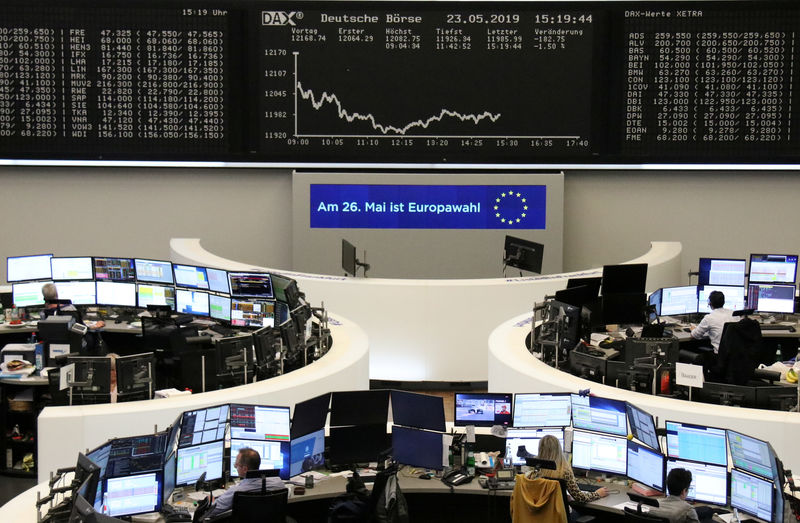European shares climbed on Monday as investors snapped up automaker stocks following confirmation of merger talks between Fiat Chrysler and Renault, and after pro-EU parties kept a firm grip on power in elections to the European Parliament.

The pan-European STOXX 600 added 0.23% with all major European indices in the black, although trading volumes were thin with markets closed for public holidays in the United States and Britain.
The MSCI world equity index, which tracks shares in 47 countries, was ahead by 0.06%.
Auto stocks climbed 1.6% as Italian-American carmaker Fiat Chrysler confirmed it had made a “transformative merger” proposal to French peer Renault in a deal which would create the world’s third-biggest carmaker. Shares of both companies surged.
Markets were also buoyed by provisional results from the EU elections that showed liberals and Greens matching a surge by eurosceptic parties, which took a quarter of seats but failed to dramatically alter the balance of power in parliament.
Stéphane Barbier de la Serre, macro strategist at Makor Capital Markets, said investors may add more cash to euro zone stocks after the election results. But he cautioned that bigger headwinds facing the regional and global economy, such as trade wars and Brexit, were likely to limit the size and pace of inflows.
“I have a feeling that investors wouldn’t have considered entering the market again until the outcome of the elections. The results are slightly positive in the end so we may see customers recommitting. But until I see it, it’ll be St Thomas,” he said, referring to the Christian Apostle Thomas, known as doubting Thomas.
Investors had been worried about eurosceptic parties gaining a 30% share of seats — the level at which they could seriously disrupt European governance and the region’s ability to show unity in addressing key concerns like a global trade war.
Far-right, nationalist or anti-EU groups nevertheless came out on top in Italy, Britain, France and Poland.
“The impression of a fragmented political system remains, but perhaps when all is said and done, the message will be that Brexit has reduced appetite to leave the EU,” said Kit Juckes, FX strategist at Societe Generale.
A stronger voice for the liberals and Greens could see the next EU executive seek a tougher line on regulating polluting industries, taxing multinational companies or demanding trading partners help contain climate change.
The euro initially rallied above $1.12 but later slipped 0.1% to $1.1196.
“In the simple world of FX a possible crisis is averted, leaving us with familiar issues. Europe needs more growth and while EU leaders argue over who gets which top jobs, it needs easier fiscal policy perhaps most of all,” Juckes said.
Greek stocks jumped 6.1% and were on track for their best day since early February 2016 after Prime Minister Alexis Tsipras called a snap election following a drubbing for his left-wing Syriza party in the EU poll.
Investors are hoping the opposition conservative New Democracy party, which won the European election in Greece, can seize on Tsipras’ unpopularity and on anger against austerity in a general election.
Greek 10-year bond yields dropped to a new record low and were set for their biggest one-day fall since December 2017.
The spread between the German 10-year bond yield, considered one of the world’s safest assets, and the Italian 10-year government bond yield was little changed after initially narrowing.
Spanish and Portuguese bond yields hit record lows — a sign of investor confidence after the election results.
Elsewhere, U.S. President Donald Trump’s visit to Japan was overshadowed by trade tensions. Trump pressed Japanese Prime Minister Shinzo Abe to even out a trade imbalance with the United States.
Escalating trade tensions between the United States and China have rattled investors in recent weeks, pressuring stocks lower just as concerns build about weakening momentum in the world’s largest economies.
The yen, often the currency of choice for nervous investors, fell 0.2% against the dollar to 109.49 but remained close to four-month highs hit earlier in May as traders looked for safety in the face of mounting trade-related woes.
The dollar rose 0.1% against a basket of currencies.
China’s yuan rose to a 1-1/2 week high against the U.S. dollar on Monday, buoyed by a senior official’s warning not to bet against the Chinese currency.
The pound weakened 0.2% to $1.2687 but remains above a near five-month low of $1.2605 struck last week after British Prime Minister Theresa May said she would step down — triggering a leadership contest during which investors fear the risk of a no-deal Brexit will rise.
Oil prices steadied after earlier extending losses from last week when crude dropped the most this year. Concerns the Sino-U.S. trade war could trigger a broad economic slowdown have sent this year’s oil rally into reverse, although OPEC’s supply cuts have provided some support.
Front-month Brent crude futures, the international benchmark for oil prices, rose 0.48% to $69.17 per barrel while U.S. West Texas Intermediate (WTI) crude futures shed 0.1% to $58.58 per barrel.







